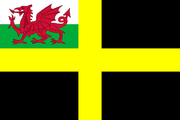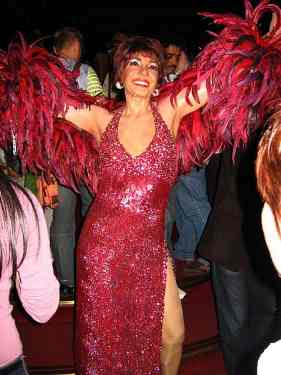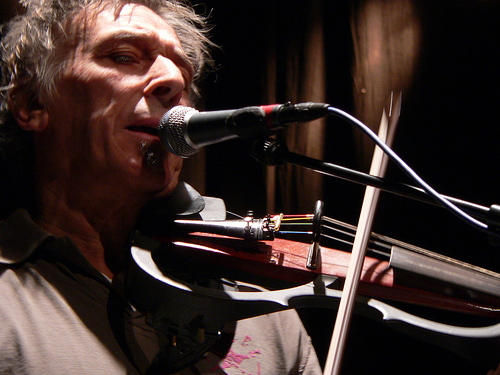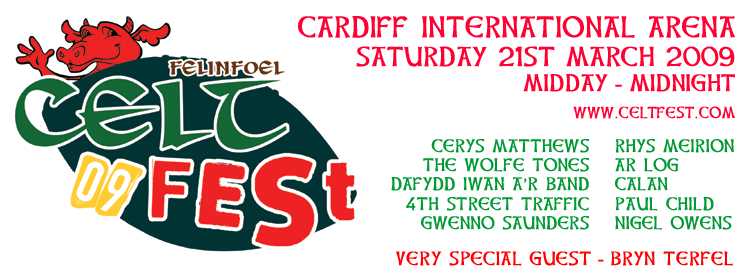Blogs
New York Public Library presents - Welsh Music Series for Wales Week & Owen Sheers and Paul Watkins in Discussion
By Ceri Shaw, 2009-02-27
| | |
Welsh Music Series for Wales Week, March 1-8
From the page:- "As part of Wales Week, The New York Public Library for the Performing Arts is presenting a week-long series, Music of Wales: Screenings from Welsh Television that includes programs of opera, jazz, popular music, and rock. Opening March 1 with a 2006 recital by the bass-baritone Bryn Terfel, the series also features a documentary about Welsh harpist Catrin Finch, The Merry Widow performed by the Welsh Opera, a concert by popular stylist Shirley Bassey, a documentary on the international hit singer Petula Clark, a jazz concert by Liane Carroll, and a rock concert by John Cale, among others. All of these videos will be having their American premieres. The programs have been donated by BBC Wales and by S4C (the rock concert) to the Library's archival collections." ... .MORE .
Wales Week: Owen Sheers and Paul Watkins in Discussion Thursday, March 5, 6:30
From the page:- "In celebration of Wales Week, renowned Welsh authors Owen Sheers and Paul Watkins will be in discussion together at the Humanities and Social Sciences Library on March 5. On Saturday, March 7 poets Samuel Menashe and Jon Curley visit the Jefferson Market Branch to share their work and discuss their craft. The Library presents more than 20,000 free public programs throughout its 87 branches in the Bronx, Manhattan, and Staten Island annually, complementing its broad collections and other services. ... .MORE .


( Reproduced from an email circular. For full details on CeltFest , including ticket sales, please visit WWW.CELTFEST.COM . Watch the CeltFest Video below and here . )
Cardiff International Arena - in the very heart of Wales's capital - will play host to CELTFEST '09 , a day-long festival on March 21st 2009, the day of the Wales and Ireland match - final game of the RBS Six Nations Championship - featuring the very best entertainment from both nations plus:
Largest pre- & post-match party in Wales!
Giant Screen showing Wales v Ireland game from the Millennium Stadium - the CeltFest screen is the largest screen ever used in Wales!
Largest Bar Facilities in Cardiff: world-class Welsh ales from champion brewers Felinfoel.
All Day Speciality Foods.
Celebrity hosts and comperes from the world of sport and television, including Rugby legends - past & present!
CeltFest is a Six Nations Celebration, a celebration of the very best entertainment from Wales & Ireland, an all day festival providing an amazing atmosphere and surroundings to enjoy the full experience which only Wales v Ireland in Cardiff can provide!
This is the first time such an impressive and varied line up has been presented on the same bill, it includes world star and special guest - BRYN TERFEL, Welsh Queen of Pop - CERYS MATTHEWS, Ireland's number one folk group - THE WOLFE TONES, Welsh patriotic icon - DAFYDD IWAN, plus much, much more.
CELTFEST IS THE ULTIMATE MATCH DAY ENTERTAINMENT EXPERIENCE!.
One ticket, costing only 25, will provide admission to the venue for the full day - midday to midnight. Upon entrance to CeltFest, ticket holders will receive a special CeltFest wristband, allowing you to leave and return to the venue at any time throughout the event.
Whether you have a ticket for the game or not, CeltFest is the best place to be to savour the greatest party in Six Nations history. CeltFest will be a sell out event, early booking is recommended.
For full details on CeltFest, including ticket sales, please visit WWW.CELTFEST.COM
Watch the CeltFest Video below and here .

Amy Wadge is a folk and country singer who originally came from Bristol, just over the Welsh border, but who has now crossed over and been adopted by her now-native Wales. She is one of the most popular singer-songwriters in Wales, and has won great critical acclaim as well as a number of awards and has supported music legends such as Van Morrison, Damien Rice, and Jeff Beck.
Amy Wadge - A Design for Life (Live)
Amy has recently been selected to perform at the prestigious SXSW Festival in Austin, Texas in March, 2009.Q1 What part of Wales do you live in?
I live in Church Village in Pontypridd
Q2 When did you cross the border to Wales and why?
I moved here 15 years ago to study acting at the Royal Welsh College of Music and Drama and then met my husband and never went back - I love it here!!
Q3 How would you describe your music?
Alternative country is the most accurate description but there are folk influences too with a bit of rock thrown in for good measure.
Q4 You have recently been selected to showcase at the legendary South by Southwest festival in Austin, Texas, do you have any other overseas gigs planed in the near future?
I'm hoping to build up something in America as I'd love to tour there - I have a one year old so touring abroad is a little bit harder these days - but I can always bring her with me!!!
Amy Wadge - Freefall (Live)
Q5 You toured Australia as a Welsh Assembly Government Cultural Ambassador during the 2003, Rugby World Cup. Did that result in any interesting or odd stories to tell?
I had a blast there. I did some pretty bizarre gigs though - including one in the middle of a seal pool - (literally on a rock) for the president of new south wales. It was a brilliant trip though and I'll never forget the Wales / New Zealand game it was amazing Wales played out of their skins and we drank til 5 in the morning and then had to fly home.
Q6 So far where has been you favorite place to perform?
I did play the Albert Hall with Jeff Beck for two nights and that was pretty amazing - but honestly you can't beat gigs at home - when I play Cardiff it's always really special.
Q7 What is your favorite haunt in Wales?
I spent a lot of time in Moelfre on Anglesey recording an album and it is still the most beautiful place on earth to me - absolute paradise!
Q8 What are your dreams and ambitions for the future?
I just want to carry on making my living with music - I am lucky that I get to do this everyday and I hope I always will.
Q9 What do you think is the best way for Wales to go about raising its profile overseas?
Just to be true to itself. There is so much talent here that goes un-noticed - Wales needs to have a bit of confidence hopefully the likes of Duffy will pave the way for more people to get noticed.
Q10 - Do you have any messages for our AmeriCymru readers?
Really hope to see some of you in the future at gigs - and if you are at South by southwest please come and say hello.
For more information about Amy please visit her website at: www.amywadge.com or her MySpace site at: www.myspace.com/amywadge
What the papers have to say:
'Pint sized poetess with valley quaking voice. Her songs have a raw vibrancy that suit her earthy voice and emotionally mature lyrics' - Q magazine
'The new Joni Mitchell, with her distinctive voice and well-crafted songs' The London Evening Standard
'The Voice of her generation - a star is born' - Ouest-France
By David L. Parry

We do not often resort to appeals of this kind. We know that its only by making this a worthwhile site that we will attract new members. With that in mind we attempt to be as entertaining and informative as we can and we are always on the lookout for new features for our members to enjoy. Hopefully a number of new and exciting features will be introduced over the next week or so,.... BUT many of you may have noticed that we now have 978 members. We would love to make our one thousandth member by, or on, St David's Day. We feel that it would be a superb way to celebrate a special occasion on the site.
So we are appealing to anyone who may still have friends or family members who they havent invited to please do so now. Also if you've already invited people ...ask them to join again. Uncle Dai needs you on St. David's Day!
( The easy way to invite members is to go to the "Invite" tab on the main navigation bar in between "Home" and "MyPage". Click on it and simply enter the email addresses of the persons you want to invite. Include a comma between each address if there is more than one. You can add a short personal message if you want but either way the email will appear as a personal invite from you in the recipients inbox . Hope that helps. )
Lets make it 1000 by March 1st!
Diolch yn fawr
Americymru

Weve added a few new features over on the Americymru Blog,...some tunes and a twitter feed in the right hand column. You can join the site by registering with your Google or Yahoo password and there is a comment wall and a few other "social" features enabled. We'll be adding more as Google Friends Connect adds to its repertoire:-
http://americymru.blogspot.com
Meanwhile our new chat feature and the new updated and revamped photo, video and music players are all scheduled for release on Thursday night ( probably about 7 p.m. Pacific Time ). If all goes according to plan you'll find chat in a bar at the bottom of the page ( a la Facebook ) and you will be able to access it from every page on the site. Also ( assuming that it works ok ) we'll put the new music player at the bottom of the page as well so you'll be able to access our music library while chatting or IM'ing.
More new features coming soon. Stay tuned!



